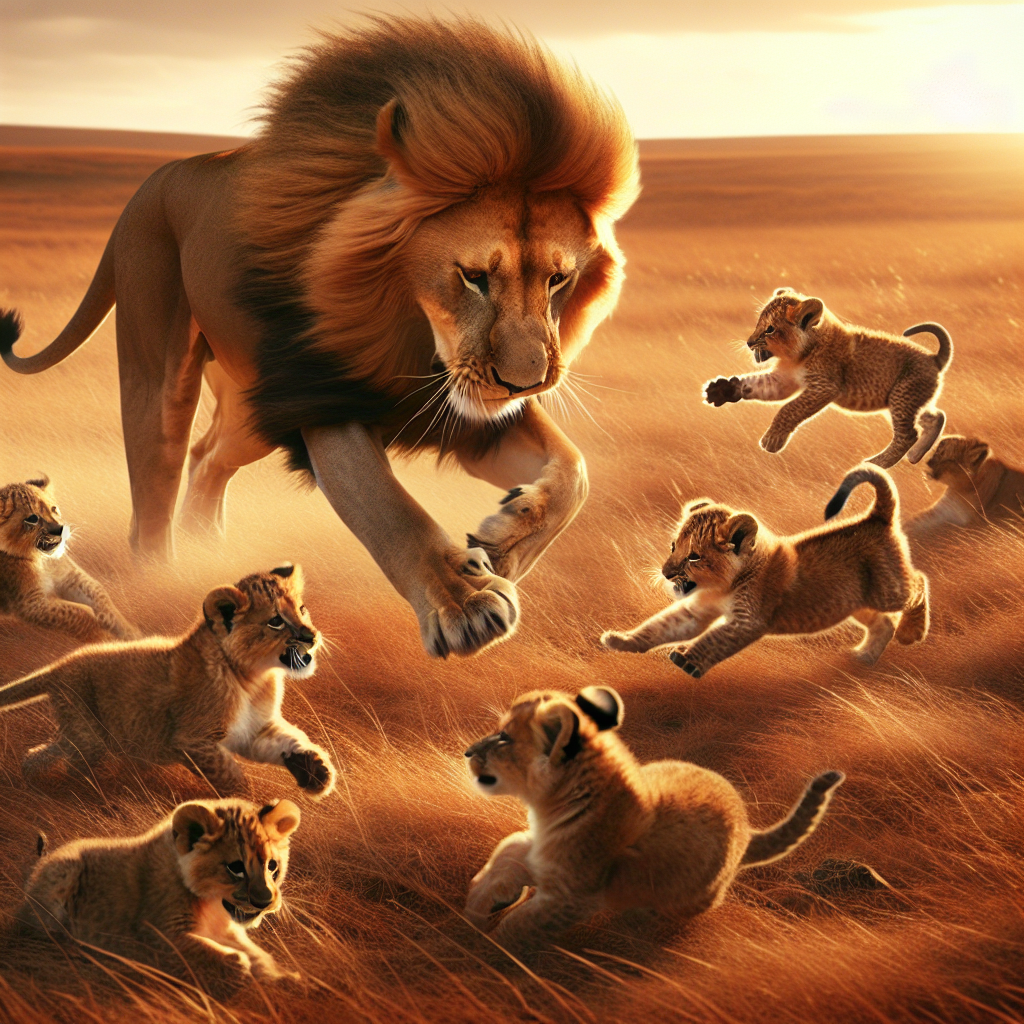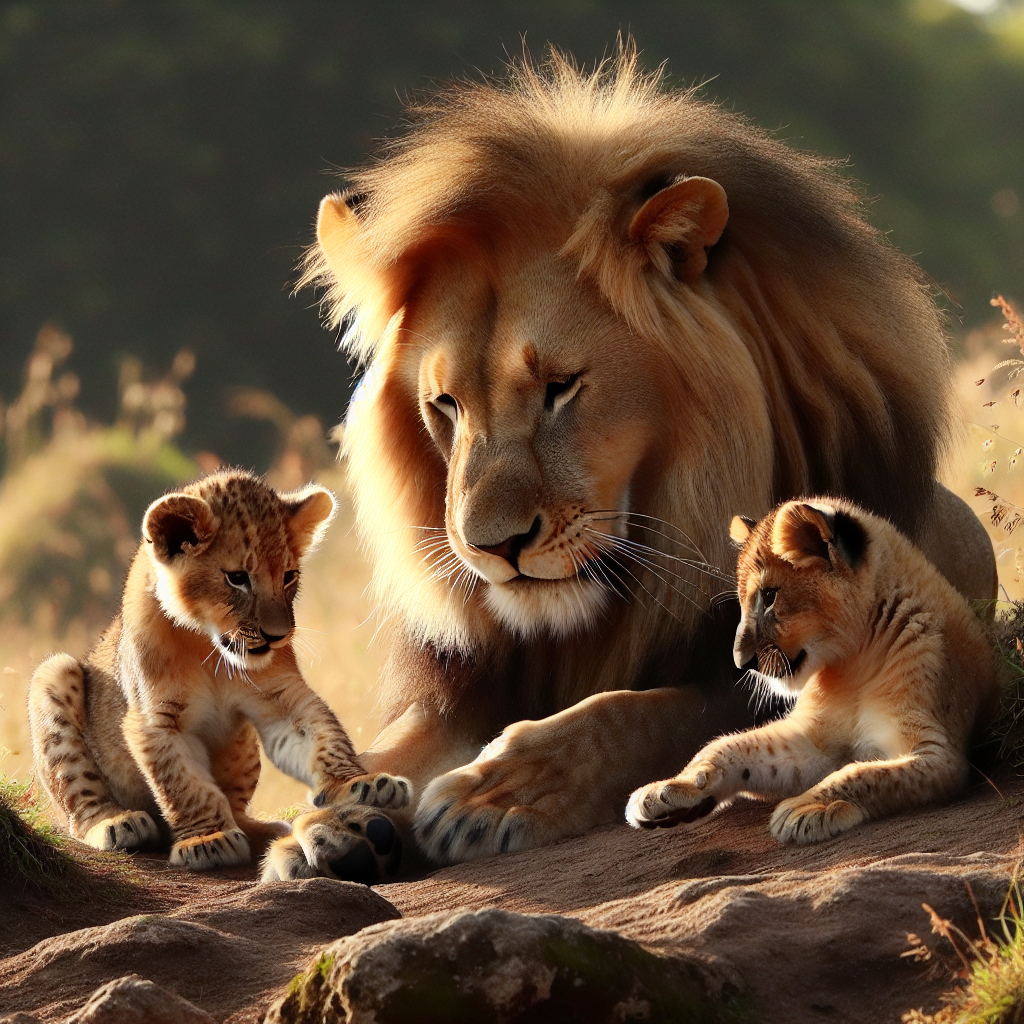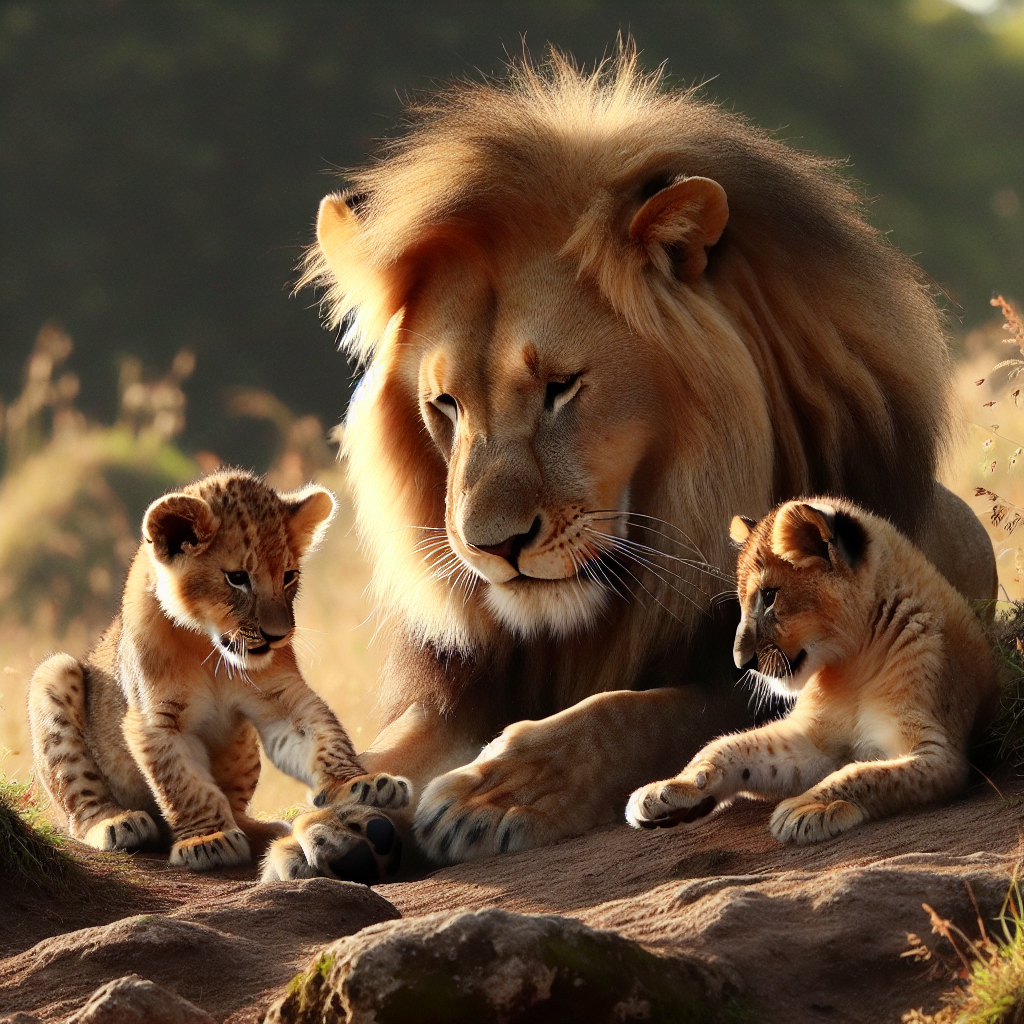So you’ve often wondered, do lions play with their cubs? It’s a question that sparks curiosity and paints a picture of playful lion cubs frolicking under the watchful gaze of their majestic parents. In this article, we’ll explore the fascinating world of lion parenting and discover whether these magnificent creatures engage in the joyful act of playing with their young ones. Get ready to venture into the wild and uncover the delightful secrets of lion family dynamics.
Overview
Introduction to lion behavior
Lions are known for their majestic and powerful nature, but they also have a playful side. Play is an integral part of lion behavior, especially when it comes to their cubs. It not only serves as a source of entertainment, but it also plays a vital role in their development, social bonding, and learning. Understanding the types of play, the benefits it offers, and the involvement of parents in play behavior is essential to grasp the significance of play in the lives of lions.
Importance of play for cubs
Play is particularly crucial for the cubs as it contributes to their physical and cognitive development, social bonding, and preparation for adulthood. Through play, lion cubs acquire essential skills, build strength and coordination, foster bravery and confidence, and establish relationships with their siblings and parents. It also serves as a means of establishing and understanding their place within the social structure of the pride. Now, let’s delve deeper into the different types of play exhibited by lion cubs.
Types of Play
Stalking and chasing
One of the most common forms of play among lion cubs is stalking and chasing. This playful behavior mimics the hunting instincts of adult lions. The cubs take turns being the prey and the predator, as they pounce and chase each other in a game of tag. This type of play helps them develop their hunting skills, enhance their coordination, and satisfy their natural instincts.
Wrestling and roughhousing
Another form of play exhibited by lion cubs is wrestling and roughhousing. They engage in playful fights where they wrestle, bite, and pounce on each other. This type of play helps them develop their physical strength, agility, and reflexes. It also allows them to practice their defensive and offensive techniques, which are essential for survival in the wild.
Object play
Lion cubs also engage in object play, where they interact with various objects found in their environment. This playful behavior includes tossing, batting, and pouncing on objects like sticks, rocks, or even their prey’s remnants. Object play helps them improve their coordination, enhance their motor skills, and learn how to manipulate objects, which are vital skills for hunting and survival.
Role play
Lion cubs often engage in role play, where they imitate the behavior of adult lions. They practice their future roles as hunters, defenders, and leaders within the pride. Role play allows them to learn and reinforce social behaviors, such as dominance, submission, and cooperation. It also helps them understand the dynamics of the pride and their place within it.

Benefits of Play
Physical development
Play contributes significantly to the physical development of lion cubs. Stalking, chasing, wrestling, and object play require physical exertion, which helps build their muscles, stamina, and coordination. These playful activities enhance their overall physical capabilities, equipping them for the challenges they will face as they grow older.
Social bonding
Play serves as a crucial tool for social bonding among lion cubs. Engaging in playful activities with their siblings and pride members strengthens their relationships, fosters trust, and establishes a sense of unity. Through play, they learn how to interact with one another, communicate effectively, and establish a hierarchy within the pride.
Learning and skill development
Play is an essential component of the learning process for lion cubs. Through various forms of play, they acquire and develop essential skills necessary for their survival in the wild. Whether it’s hunting techniques, defensive maneuvers, or social behaviors, cubs learn and refine these skills through play, preparing them for future challenges.
Preparation for adulthood
Play serves as a vital tool in preparing lion cubs for adulthood and the responsibilities that come with it. Through play, cubs practice the skills they will need as adults, such as hunting, defending the pride, and establishing dominance. It allows them to gain confidence, experience, and knowledge, ensuring a smoother transition into adulthood.
Parental Involvement
Maternal play
Mothers play an essential role in facilitating play behavior among lion cubs. Lionesses engage in play with their cubs, providing them with valuable learning experiences and guidance. They initiate play sessions, encourage their cubs to participate, and teach them essential hunting and social skills. Maternal play strengthens the bond between mother and cub, ensuring a nurturing and secure environment for the cubs’ development.
Paternal play
While maternal play is more prominent, lion fathers also engage in play behavior with their cubs. They often join in wrestling matches, chase their cubs, and provide them with valuable lessons in hunting and survival. Paternal play helps establish the cubs’ connection with their father, allowing them to learn from both parents and develop a well-rounded skill set.
Cooperative play
Cooperative play is also observed among lions, where cubs engage in playful activities with their siblings. This type of play strengthens the bond between littermates and helps them learn important social skills, such as cooperation, sharing, and communication. Cooperative play also fosters a sense of unity within the pride, ensuring a cohesive and coordinated group dynamic.

Play Behavior Over Time
Playful behavior in newborn cubs
Even from a very young age, lion cubs exhibit playful behavior. Newborn cubs engage in gentle and clumsy play, which includes pawing at their siblings, rolling around, and practicing basic movements. While their play is initially limited, it gradually becomes more intricate and refined as they grow older.
Development of play as cubs grow
As lion cubs enter their second month, their play becomes more active and robust. They start participating in stalking and chasing games, wrestling matches, and object play. Their physical strength and coordination improve, allowing them to engage in more complex and dynamic play behavior. This developmental progression provides them with the necessary skills they will need for survival in the wild.
Changes in play behavior as cubs become adults
As lion cubs reach adolescence and adulthood, their play behavior gradually diminishes. The playful activities that were once crucial for their development become less frequent as they shift their focus to more adult responsibilities, such as hunting, defending the pride, and mating. However, traces of play behavior can still be observed among adult lions, mostly during moments of relaxation and interaction within the pride.
Gender Differences
Different play behavior among male and female cubs
Lion cubs exhibit some gender-specific differences in their play behavior. Male cubs often engage in more rough and aggressive play, mimicking the behavior of adult male lions. They wrestle more fiercely and typically display more dominant tendencies. Female cubs, on the other hand, engage in more cooperative play and are often observed caring for and nurturing their younger siblings. These gender-specific play behaviors reflect the future roles and responsibilities that males and females will assume within the pride.
Role of play in gender-specific skills
Play behavior also plays a crucial role in developing gender-specific skills among lion cubs. Male cubs engage in more physical and aggressive play, allowing them to hone their hunting and defensive skills. Female cubs, on the other hand, focus more on nurturing and caring for their siblings, preparing them for their future role as mothers within the pride. Play provides a platform for cubs to learn and develop the skills they will need based on their gender-specific roles.

Role of Play in Survival
Honing hunting skills
Play is instrumental in helping lion cubs hone their hunting skills. The stalking, chasing, and object play they engage in during their playful sessions mimic the behaviors they will need to hunt effectively. Play allows them to practice their techniques, improve their coordination, and develop their predatory instincts, all essential for successful hunting and survival in the wild.
Building strength and coordination
Play also plays a significant role in building the physical strength and coordination of lion cubs. The wrestling, roughhousing, and object play they partake in require agility, strength, and coordination. Through playful activities, cubs develop their muscles, reflexes, and overall physical capabilities, enabling them to become formidable hunters and defenders as they grow older.
Fostering bravery and confidence
Playful behavior fosters bravery and confidence among lion cubs. Through play, they learn to take risks, face challenges, and overcome adversity. Whether it’s testing their hunting skills or engaging in pretend battles with their siblings, play provides a safe environment for cubs to build the courage and confidence they will need to navigate the harsh realities of their future lives as adult lions.
Play and Social Structure
Play as a means of establishing hierarchy
Play serves as a means of establishing and understanding the hierarchy within the pride. Lion cubs engage in play that involves elements of dominance and submission, allowing them to determine their place within the social structure. Through play, cubs learn the rules and dynamics of the pride, ensuring a smoother integration into the adult social structure as they mature.
Importance of play for subordinate cubs
Play holds particular importance for subordinate cubs within the pride. Subordinate cubs often engage in more submissive play behavior, allowing them to establish their role and avoid conflicts with more dominant littermates. Play provides them with an opportunity to learn and develop strategies to cope with their subordinate status, ensuring their survival and well-being within the pride.

Cultural Variations
Differences in play behavior among lion prides
Different lion prides may exhibit variations in play behavior. Factors such as environmental conditions, availability of prey, and social dynamics within the pride can influence the types and frequency of play. Some prides may engage in more object play due to the abundance of stimulating objects in their environment, while others may focus more on stalking and chasing to mimic the hunting conditions specific to their habitat.
Influence of environment on play
The environment has a significant influence on lion play behavior. Prides living in more open savannahs may engage in more active and physical play, utilizing the vast space for stalking and chasing games. In contrast, prides living in dense forests may engage in more object play, using the available vegetation and tree branches as playful props. The environment shapes and molds play behavior, allowing cubs to adapt and thrive in their specific habitats.
Human Interaction
Role of human intervention in lion play
Human intervention can impact play behavior among lions, especially in captive settings. Caretakers and researchers often provide opportunities for play by introducing toys or engaging in interactive play with captive lion cubs. This human interaction stimulates play behavior and allows the cubs to receive the benefits of play despite being in a controlled environment. However, it is essential to ensure that the play provided aligns with the natural behaviors and needs of the lions.
Impact of captive settings on play behavior
Captive settings can influence the play behavior of lions in several ways. Limited space and resources can restrict the range of playful activities available to captive lion cubs. Furthermore, the absence of wild prey can hinder the development of hunting skills through play. Human interaction and play opportunities, though beneficial, cannot fully replicate the complexities and nuances of play behavior exhibited by lions in their natural habitat. Understanding the impact of captivity on play behavior is crucial for the well-being and enrichment of captive lions.
In conclusion, play is an integral part of lion behavior, particularly when it comes to their cubs. Stalking and chasing, wrestling and roughhousing, object play, and role play are all observed within lion cubs’ playful repertoire. Play offers numerous benefits, including physical development, social bonding, learning, and preparation for adulthood. The involvement of both parents, maternal and paternal play, plays a vital role in facilitating play behavior. Playful behavior evolves over time, with cubs gradually transitioning into more adult responsibilities. Gender differences in play behavior reflect future roles within the pride, while play also contributes to survival skills, social structure, and variations among different prides. Human interaction and captive settings can impact play behavior, but understanding and respecting the natural instincts and needs of lions is crucial in providing an environment that supports their playful nature.


